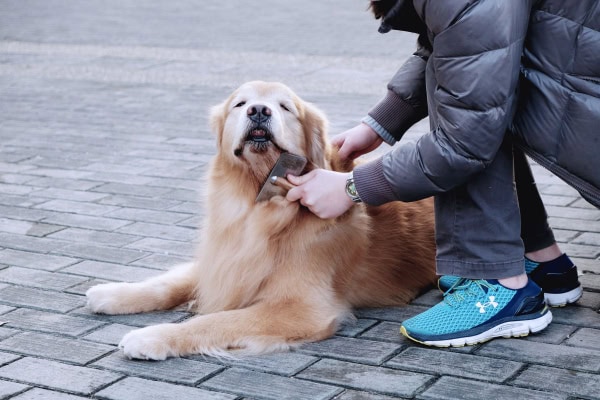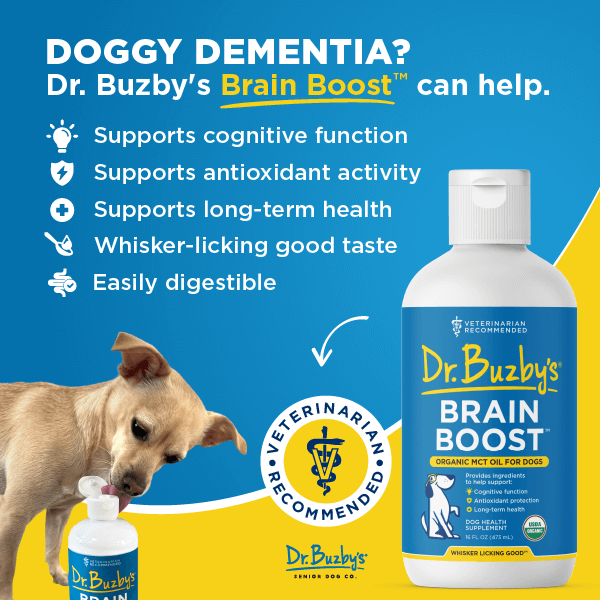MCT oil for dogs has been gaining popularity recently. But what exactly is this supplement and how might it help your dog? Integrative veterinarian Dr. Julie Buzby explains the science behind MCT oil, its benefits and uses, how to select an MCT oil supplement, and why she thinks it is a promising supplement for dogs—especially those with dementia or epilepsy.

Have you heard of MCT oil for dogs? As an integrative veterinarian with 25+ years of experience caring for dogs, I’m constantly searching for more ways to help my beloved senior patients. As I researched MCT oil, I quickly realized this was a solution worth sharing with my own patients and with you.
Join me as I give you an overview of MCT oil with the intent of helping you decide if it could be right for your own grey-muzzled companion.
What is MCT oil for dogs?
MCT is short for medium chain triglyceride. So MCT oil is a supplement that comes in the form of an oil that contains medium chain triglycerides (MCTs). To really understand what that means, I need to take you back to high school science class for a moment.
Triglycerides are a type of fatty acid that can be found in foods and have varying numbers of carbon atoms. Short chain fatty acids have less than 6 carbon atoms, medium chain fatty acids have 6-12, and long chain fatty acids have over 12 carbon atoms.
While there are benefits to each type of fatty acid, in this article, we will focus on medium chain triglycerides. Medium chain triglycerides are comprised of caproic acid (C6:0), caprylic acid (C8:0), capric acid (C10:0), and lauric acid (C12:0).(1)
Of the four types of medium chain triglycerides, research has demonstrated a quality MCT oil for dogs is composed of caprylic acid (C8:0), capric acid (C10:0), or a mixture of both.(2) Typically, the MCTs in an MCT oil supplement for dogs will come from coconut oil or palm oil.
How does the body use MCTs?
When a dog takes an MCT oil supplement, the body quickly absorbs the MCTs so they can go to work. The two MCTs of interest for dogs, caprylic acid (C8:0) and capric acid (C10:0), benefit the body in different ways.
Let’s take a look at the unique benefits of each.
Caprylic acid (C8:0) provides quick energy for the brain
MCT oil is instantly absorbed and broken down to provide the brain a quick source of energy, called ketones (which you may be familiar with if you have tried a ketogenic diet). Specifically, caprylic acid (C8:0) provides the brain with a type of ketone called beta-hydroxybutyric acid. These ketones act as an alternative source for fuel for a dog’s brain. You see, the brain normally relies on glucose for energy. But the amazing thing about the ketones from caprylic acid is that they are much easier for the body to metabolize compared to glucose.
Note: The level of ketones produced in the body from MCT supplementation is much lower than the level that would occur in starvation or diabetic ketoacidosis (DKA in dogs). And unlike those conditions, the ketones from MCT oil do not cause a state of acidosis.(9) This is important because acidosis can cause an accelerated heart rate, fatigue, loss of appetite, nausea, weakness, and other unpleasant symptoms.
Having ketones as an alternative source of brain energy is good for any dog. But it is particularly important for our elderly dogs. As their brain ages, senior dogs may experience degenerative diseases such as Canine Cognitive Dysfunction (CCD). And their ability to use glucose as an energy source decreases.(7, 9) This leaves the brain with less energy, which can play a pivotal role in the progression of CCD and other age-related degenerative diseases.

Capric acid (C10:0) supports mitochondria, the powerhouse of the cell
Capric acid (C10:0) supports the creation of mitochondria. If you think back to high school biology again, you will remember that mitochondria are the power factories of the cell. These important organelles create more energy within the cell. This is great because as we were just discussing, brain cells need energy to function well.
Plus, capric acid (C10:0) has an anti-inflammatory effect on neurons.(10) So in addition to providing energy to an aging brain, capric acid plays a starring role in reducing neuronal hyperexcitability. As a result, it can increase the seizure threshold for dogs who experience seizures.(9) This means there’s potential for less intense and less frequent seizures!
That’s the science. But to help you understand what this means for your dog, let’s pretend your dog’s brain is a car.
If your dog’s brain was a car, MCTs would provide the gas and cylinders to create energy
Cars need fuel to go. And a dog’s brain needs fuel to work too. Normally, the “fuel” for a dog’s brain comes in the form of glucose (sugar). However, especially as dogs age, their brains have more trouble using glucose. This can leave them low on “brain energy.”
But the cool thing about caprylic acid (C8:0) is that it can provide some easy-to-use “gas” for the brain. And by supporting the creation of mitochondria, capric acid (C10:0) give your dog’s brain “engine” more cylinders to create energy—sort of like a vehicle with a V8 engine creates more power than a V6.
What are the benefits of MCT oil for dogs?
The way MCT oil works in the body is definitely exciting. But what I love most about it is how it can help dogs with canine cognitive dysfunction or seizures. Let’s take a closer look at how MCT oil could benefit dogs with each condition.
MCT oil for dogs with canine cognitive dysfunction
Canine cognitive dysfunction (CCD) is the canine equivalent of Alzheimer’s disease. And it is caused by age-related changes to the brain. More specifically, a decrease in blood flow throughout the brain causes dysfunction of neurons that carry information throughout the body. And overall the brain’s ability to process and communicate information to the body declines.(18)
With CCD, a dog’s brain gradually degenerates. This leads to signs of dementia in dogs such as disorientation, unusual interactions, sleep/wake cycle disturbances, house soiling, changes in activity levels, anxiety, and memory changes.
Dementia usually occurs in dogs greater than 8 years old and affects 14-35% of the pet dog population. CCD can also affect approximately 30% of dogs between 11-12 years old and over 68% of dogs older than 15 years.(6) This means many of our beloved senior dogs will be prone to dementia as they age.

But here’s the good news for aging dogs!
There is no cure for CCD. But adding MCT oil to a senior dog’s diet can greatly improve his or her overall cognitive ability.(3) As with all progressive diseases, early diagnosis and intervention positively affect the disease outcome. In fact, the American Animal Hospital Association (AAHA) recommends supplementing with MCT oil as part of the management of CCD since studies have demonstrated its effectiveness for improving cognitive ability, managing CCD, and maintaining a good quality of life in senior dogs.(3)
How can MCT oil do all of this for our senior dogs? Let’s dive back into the science.
Why MCTs help support an aging dog’s brain
Researchers believe the brain benefits of MCTs occur because capric acid (C10:0) has great neuroprotective and anti-inflammatory effects. These properties help protect against damage to the neurons which occurs with degenerative diseases such as CCD.
Additionally, both caprylic acid (C8:0) and capric acid (C10:0) have the ability to support neuronal growth and repair and maintain neurons.(10) This is great because dogs need neurons (i.e. brain cells) for optimal brain function.
Finally, as mentioned above, caprylic acid (C8:0) provides an easy-to-use alternative energy source for the brain. This is perfect since our senior dogs with CCD often have more trouble using the “traditional” brain energy source, glucose.
Said another way, our dear senior dogs who are struggling with the burden of mental decline can rediscover some of that inner puppy again through the power of MCT oil. It’s a boost of energy that an aging dog’s brain needs. Plus, it helps protect and support brain cells. All of these benefits of medium chain triglyceride (MCT) oil can help a senior dog’s brain keep working as well as it possibly can.
The studies supporting the benefits of MCT supplementation for dogs with CCD
A variety of studies show that supplementing with MCT oil improves canine cognitive performance on a range of behavioral tasks.(4)
These three studies are particularly exciting:
- When compared to a non-supplemented diet, dogs who consumed a diet supplemented with MCTs improved their cognitive performance on tasks just two to eight weeks after starting the supplementation. These dogs also improved their performance on these tasks for up to six months after starting dietary supplementation with MCTs.(5)
- A study observing Beagles between 7.5 to 11.6 years of age while supplemented with MCTs showed an improvement in a variety of cognitive performance tasks as early as 30 days after beginning the MCT supplementation.(8)
- In a 2018 study, dogs who were administered a diet high in MCTs demonstrated improvement in five out of six measurements of cognitive decline (i.e. they were showing fewer signs of cognitive decline in those categories) within 30 days of starting the diet. And there was significant improvement observed in all six areas within 90 days of starting the diet.(11)
The results of these studies are remarkable. They demonstrate that MCT oil has a great potential to improve cognitive function in senior dogs, including those with CCD. This is huge because the decline in cognitive function is what makes caring for a dog with CCD so challenging. If we can slow down the rate of decline and even improve brain function, this can potentially give our beloved senior dogs more good years.

MCT oil for seizures in dogs
A seizure results from excessive electrical activity in one area of the brain that spreads outward. There are many types of seizures because any abnormal involuntary repetitive behavior may represent seizure activity.(18)
Understandably, seizures in dogs can be very disturbing to observe. Affected dogs often collapse, paddle their legs, and then experience a period of confusion or overattachment to their owners afterward. Additionally, over time, clinical seizure activity can cause brain degeneration, leading to cognitive impairment. Interestingly, the cognitive impairment observed in dogs with epilepsy appears similar to cognitive changes seen in dogs with CCD.
A study observed the behavior in epileptic dogs under the age of four years. And it showed that compared to dogs without epilepsy, epileptic dogs were less trainable, had a harder time obeying simple commands, were slower to learn new commands and were less likely to pay attention or listen to their owner. Dogs who experienced a high number of seizures or cluster seizures were more likely to show these signs of cognitive impairment.(16) These are young dogs. Yet they essentially have the brain of a much older dog.
The good news is that MCT oil may play an important role in decreasing seizure intensity and frequency. Plus, it can also have a protective effect against the cognitive impairment behaviors observed in epileptic dogs.
Why MCTs are beneficial for dogs with seizures
What exactly in the MCT oil helps dogs with seizures? Well, we know that specifically, capric acid (C10:0) blocks receptors in the brain from excitation. This gives it an anticonvulsant effect because activation of these receptors is directly linked to the onset of a seizure.
In other words, MCT oil keeps the excitation switch from getting flipped on the brain. This may help control seizure activity.
Interestingly, this isn’t how most anticonvulsant medications work. Unlike capric acid (C10:0), which works on the activation pathway, most anticonvulsant medications stimulate the inhibitory pathways of the brain. This means they work by dampening nerve impulses. While these anticonvulsants are effective, their mode of action also causes most of the negative side effects we can see with anticonvulsants such as sedation, ataxia, etc.(16)
But when used to control seizures, MCT supplementation avoids these negative side effects. This is the case because it works on a separate pathway entirely. Therefore, MCT oil makes a great supplement for dogs who are already on seizure medication. And studies have shown MCT oil can even lower the dose of seizure medication it takes to control seizures in some dogs.
Additionally, as discussed earlier, capric acid (C10:0) supports the creation of new mitochondria. This means the cell is able to replace mitochondria that are damaged as a result of chronic seizures.
Overall, research has demonstrated when caprylic acid (C8:0) is administered in combination with capric acid (C10:0), it has enhanced anti-seizure effects on dogs with seizures.(17)

In other words, MCT oil has the potential to help reduce seizures without some of the negative effects of other anti-seizure medications. Plus, it can have a protective effect on the brain. All of these effects make it a great potential choice for dogs with epilepsy.
The studies supporting the use of MCT oil for dogs with seizures
There have been a variety of studies demonstrating the benefits of MCT oil for dogs with seizures.
An MCT-rich diet was tested in a 6-month study in dogs diagnosed and treated for epilepsy. The dogs were randomized to consume an MCT-rich or placebo diet and switched to the opposite diet after three months. Seizure frequency and severity, and physical and neurological examination findings were analyzed for dogs who completed the study.
Amazingly…
- 71% of dogs on the MCT-rich diet showed a reduction in seizure intensity
- 48% of dogs showed a 50% or greater reduction in seizure frequency
- An astounding 14% of dogs experienced cessation of their seizures while eating an MCT-rich diet during this study!
Plus, these results were replicated in a similar study! So two studies strengthen the idea that overall, MCTs play a supportive role in the treatment of canine epilepsy.(16)
In addition to decreasing seizure intensity and frequency, MCT oil may be able to positively impact the behavioral and cognitive issues in dogs with epilepsy. A study performed in 2021 demonstrated significant improvement in the memory, problem solving ability, and trainability of epileptic dogs when they were supplemented with MCTs.(12, 15)
MCTs are an exciting addition to the seizure-control toolbox
The results of these studies are so exciting! Being able to decrease the intensity and frequency of seizures, or even stop them entirely is wonderful. We don’t want seizures to be strong, and we don’t want them to happen as often. Plus, the fact that MCT oil can protect a dog’s brain from some of the damaging effects of seizures is fantastic too!
NOTE: Your veterinarian will help you determine the best plan for your dog. MCT oil is not necessarily a replacement for the anticonvulsant medications your dog is taking. Rather, it can be a great additional tool in the seizure-control toolbox.
How do you find the best MCT oil for dogs?
Now that you know all the amazing benefits of MCT oil, you may be wondering how to pick the best MCT oil product. This is an important consideration because not all MCT oil products are the same. Research has shown that a quality MCT oil for dogs contains caprylic acid (C8:0), capric acid (C10:0) or a mixture of both. So those are what you want to look for on the label.

Beware of products containing lauric acid (C12:0)
But what you also need to watch out for is another MCT, lauric acid (C12:0). While it is a common and safe component of MCT oil products for humans, dogs should not take an MCT oil product that contains lauric acid (C12:0). Research has demonstrated that lauric acid (C12:0) has the potential to overstimulate the pancreas in dogs.(2) This could lead to GI upset, or even worse yet, a potentially-dangerous condition called pancreatitis in dogs (i.e. inflammation of the pancreas).
What makes lauric acid (C12:0) problematic is its size. You see, caprylic acid (C8:0) and capric acid (C10:0) are smaller molecules than lauric acid (C12:0). The gastrointestinal tract absorbs the smaller caprylic acid (C8:0) and capric acid (C10:0), and then they go directly to the liver, which breaks them down into ketones.
This direct path causes no stimulation of the pancreas in dogs. However, the body metabolizes larger fatty acids such as lauric acid (C12:0) differently, which does stimulate the pancreas.(17)
Unfortunately, many of the MCT oils on the market formulated for humans have some amount of lauric acid (C12:0) in them. And some “dog specific” products do too. While lauric acid does have some beneficial anti-viral, anti-bacterial, and anti-fungal properties and may support metabolism and skin and coat, the risks (e.g. pancreatitis or GI upset) outweigh the potential health benefits, in my opinion. Thus, I recommend looking for a veterinary-specific MCT oil that does not contain lauric acid (C12:0).
How refined the MCT oil product is makes a difference
Additionally, it is important to consider how refined the MCT oil product is. Less refined MCT oils have lower concentrations of caprylic acid (C8:0) and capric acid (C10:0), which decreases the potential benefits of giving your dog MCT oil. Plus, less refined oils also add excess calories to your dog’s diet. This could be problematic since gaining weight increases a dog’s risk for other common senior dog conditions such as osteoarthritis in dogs, diabetes in dogs, etc.(14)
Since I wasn’t able to find a product on the market that I could confidently recommend, my team and I set to work developing one. The end result was Dr. Buzby’s Brain Boost™ organic MCT oil for dogs, a refined MCT oil product that contains an optimal balance of C8:0 and C10:0, and is free of lauric acid (C12:0).
Is MCT oil safe for dogs?
Thankfully, overall, MCT oil is safe to use for the majority of dogs. However, as we just discussed, it is important to select a product that doesn’t contain lauric acid (C12:0) and that is more highly refined. This decreases the chances a dog will develop GI upset or pancreatitis or gain excess weight.
Like any supplement though, it is best to consult your veterinarian before starting to give your dog MCT oil. Your vet knows your dog’s health history and would be able to advise you best about your dog’s particular situation.
What are some ways I can give my dog MCT oil?
There are two main ways to add MCT oil into your dog’s diet—feeding a food that contains MCT oil or adding an MCT oil supplement on top of your dog’s food.
Feeding dog food containing MCT oil
There are some diets such as Purina Pro Plan® Veterinary Diets NC NeuroCare® that are rich in MCT oil. These foods are formulated specifically with brain health in mind. The manufacturing process involves carefully coating each kibble with a specific amount of MCT oil to ensure your dog gets an appropriate dose.
This is a nice, low-maintenance option if your dog doesn’t already need a particular type of dog food. However, like most any new food, you would need to gradually switch your dog over to the MCT oil-containing food over one to two weeks to avoid GI upset.
Adding an MCT oil supplement to your dog’s food
Alternatively, you can buy an MCT oil supplement and apply it to your dog’s regular food. This can be a great option if you don’t want to change to a new food or if your dog is already on a special or prescription diet. Adding the MCT oil to your dog’s food allows him or her to benefit from the MCT oil without losing the benefits of the current diet. And it means that MCT oil supplementation would be doable for most any dog.
Do dogs like the taste of MCT oil?
Understandably, if you are going to be adding a supplement to your dog’s food or switching to a new food, it is very important that your dog will actually eat it.
The good news is that a study performed in 2022 demonstrated that a liquid MCT oil containing a combination of caprylic acid (C8:0) and capric acid (C10:0) was well tolerated in palatability studies in dogs. And researchers noted that dogs eating two portions per day of kibble with MCT oil added on top did not show any adverse reactions such as vomiting, diarrhea, or abdominal pain.(13)
However, there were studies that observed decreased palatability for dog food that was manufactured to contain MCT oil.(17) So it is possible that some dogs may prefer to have the MCT oil added to their food rather than eating a diet manufactured to contain MCT oil.
Are there side effects of MCT oil?
Thankfully, more highly refined MCT oil products that don’t contain lauric acid tend to have minimal side effects. However, some dogs with sensitive stomachs may still develop a bit of GI upset (vomiting, diarrhea, poor appetite, etc.) at first. Thus, I usually recommend working your way up to the full dose of MCT oil over 1-2 weeks.
Additionally, at high levels, some dogs do not find MCT oil palatable. While this isn’t a side effect per se, it is still good to keep in mind.
If you have started supplementing your dog with MCT oil and believe he or she may be experiencing negative side effects, it is best to stop the supplementation immediately. Then, contact your dog’s veterinarian so he or she can advise you on the best course of action.
What is the dose of MCT oil for dogs?
Since products can vary in their caprylic acid (C8:0) and capric acid (C10:0) concentration and purity, the best way to dose MCT oil is to follow the instructions on the bottle or the feeding instructions on the bag of dog food. The big thing to remember is to work up to the full dose over 1-2 weeks to decrease the chances it will cause some stomach upset.
If you’re unsure which MCT oil product to use and how to dose it, I recommend speaking to your veterinarian for guidance.
Can my dog take MCT oil with other medications or supplements?
Thankfully, it is generally safe to give dogs MCT oil along with other supplements. This is good news since dogs with conditions like epilepsy or canine cognitive dysfunction may already be taking other medications or supplements.
However, one item to note is that MCT oil inhibits cytochrome P450 in the liver. Therefore, it decreases the rate at which some medications are metabolized. When this occurs, medications are active in the body much longer, which can occasionally allow for a decrease in dose or dose frequency.(19)
For this reason, it is important to alert your veterinarian if you are supplementing your dog with MCT oil. Your dog may require lower doses of certain medications such as antifungals or anti-epileptic medications.
Ask your vet if MCT oil could be right for your dog
The more I researched (and researched and researched) MCT oil for dogs, the more excited I got! Dementia and seizures can take a toll on a dog’s quality of life over time. So having a safe, natural supplement like MCT oil that can aid in the prevention and treatment of CCD, seizure disorders, and other brain conditions seems almost too good to be true. It is true though!
High quality MCT oils made specifically for dogs have been recognized by many, including the American Animal Hospital Association, to be a useful component of treatment for these difficult neurologic diseases.(17) And the majority of the senior dog population can tolerate the supplement well. Plus, it is easy to give your dog an MCT oil supplement or diet containing MCT oil. All of this is great news!
If you’re interested in giving MCT oil a try, don’t hesitate to reach out to your veterinarian. He or she can help you decide if this amazing brain-boosting supplement might be a good fit for your dog!
References:
- St-Onge, M.-P., & Jones, P. J. H. (2002). Physiological effects of medium-chain triglycerides: Potential agents in the prevention of obesity. The Journal of Nutrition, 132(3), 329–332. https://doi.org/10.1093/jn/132.3.329
- Mamer, O. A., Choiniere, C. J., & Boudreau, A. (2006). Increases in hepatic oxidative capacities induced by acute exercise are accompanied by transient decreases in malonyl-CoA levels in mice. American Journal of Physiology-Regulatory, Integrative and Comparative Physiology, 290(1), R83-R90. https://doi.org/10.1152/ajpregu.00290.2005
- American Animal Hospital Association. (2023). AAHA Senior Care Guidelines for Dogs and Cats. Retrieved from https://www.aaha.org/globalassets/02-guidelines/2023-aaha-senior-care-guidelines-for-dogs-and-cats/resources/2023-aaha-senior-care-guidelines-for-dogs-and-cats.pdf
- Landsberg, G. (2005). Therapeutic agents for the treatment of cognitive dysfunction syndrome in senior dogs. Doncaster Animal Clinic, 99 Henderson Avenue, Thornhill, Ontario, Canada L3T 2K9. Retrieved from https://natural-necessity.com/doc/research/Alpha-Lipoic-Acid/ALA-Cognitive-Dysfunction-in-a-Dog.pdf
- Milgram NW;Head E;Muggenburg B;Holowachuk D;Murphey H;Estrada J;Ikeda-Douglas CJ;Zicker SC;Cotman CW (2002). Landmark discrimination learning in the dog: effects of age, an antioxidant fortified food, and cognitive strategy. Neurosci Biobehav Rev. 2002 Oct;26(6):679-95. Doi: 10.1016/s0149-7634(02)00039-8. https://pubmed.ncbi.nlm.nih.gov/12479842/
- Dewey, C. W., Davies, E., Xie, H., & Wakshlag, J. J. (2019). Canine cognitive dysfunction. The Veterinary Clinics of North America. Small Animal Practice/Veterinary Clinics of North America. Small Animal Practice, 49(3), 477–499. https://doi.org/10.1016/j.cvsm.2019.01.013
- Tynes, V. V., & Landsberg, G. (2021). Nutritional management of behavior and brain disorders in dogs and cats. the Veterinary Clinics of North America. Small Animal Practice, 51(3), 711–727. https://doi.org/10.1016/j.cvsm.2021.01.011
- Pan Y, Larson B, Araujo JA, et al. Dietary supplementation with medium-chain TAG has long-lasting cognition-enhancing effects in aged dogs. Br J Nutr 2010; 103:1746-54.
- Swaab, DF; Lucassen PJ; Salehi A, Scherder EJ, van Someren EJ and Vewer RW. (1998). Reduced neuronal activity and reactivation in Alzheumer’s disease. Prog Brain Res. 117:343-77.
- Weninger, S., & Yankner, B. A. (2001). Inflammation and Alzheimer disease: The good, the bad and the ugly. Nature Medicine, 7(5), 527–528. https://doi.org/10.1038/87839
- Pan, Y., Landsberg, G., Mougeot, I., Kelly, S., Xu, H., Bhatnagar, S., Gardner, C., & Milgram, N. W. (2018). Efficacy of a therapeutic diet on dogs with signs of cognitive dysfunction syndrome (CDS): a prospective double blinded placebo controlled clinical study. Frontiers in Nutrition, 5. https://doi.org/10.3389/fnut.2018.00127
- Berk, B., Packer, R. M. A., Law, T. H., Wessmann, A., Bathen‐Nöthen, A., Jokinen, T. S., Knebel, A., Tipold, A., Pelligand, L., & Volk, H. A. (2021). Medium-chain triglycerides dietary supplement improves cognitive abilities in canine epilepsy. Epilepsy & Behavior, 114, 107608. https://doi.org/10.1016/j.yebeh.2020.107608
- Berk, B.A.; Packer, R.M.-A.; Fritz, J.; Volk, H.A. Oral Palatability Testing of a Medium-Chain Triglyceride Oil Supplement (MCT) in a Cohort of Healthy Dogs in a Non-Clinical Setting. Animals 2022,12, 1639.
- James, F., Mansfield, C., Steiner, J. M., Williams, D. A., & Robertson, I. D. (2009). Pancreatic response in healthy dogs fed diets of various fat compositions. American Journal of Veterinary Research, 70(5), 614–618. https://doi.org/10.2460/ajvr.70.5.614
- Berk, B., Ottka, C., Law, T. H., Packer, R. M. A., Wessmann, A., Bathen‐Nöthen, A., Jokinen, T. S., Knebel, A., Tipold, A., Lohi, H., & Volk, H. A. (2022). Metabolic fingerprinting of dogs with idiopathic epilepsy receiving a ketogenic medium-chain triglyceride (MCT) oil. Frontiers in Veterinary Science, 9. https://doi.org/10.3389/fvets.2022.935430
- M. Chandler and H. Volk. (2019). Fuel the Brain: Diet Considerations for the Dog with a Seizure Disorder. World Small Animal Veterinary Association Congress Proceedings. https://www.vin.com/members/cms/project/defaultadv1.aspx?pId=24437&id=9382841
- Edwards Bvsc, Alice. “NEURO-DIETETICS: MEDIUM CHAIN TRIGLYCERIDES and THEIR SCOPE as ADJUNCTIVE THERAPY for NEUROLOGICAL DISORDERS in DOGS.” Control & Therapy Series -Issue, vol. 304, 2021. Accessed 11 Apr. 2024.
- Riley, Elizabeth. “Cognitive Dysfunction Syndrome in Dogs.” VIN, Veterinary Partner, 17 Aug. 2020, veterinarypartner.vin.com/default.aspx?pid=19239&id=9773661.
- Tayutivutikul, Naim & Wanleenuwat, Pitchaya & Panapongvasin, Thanaphat & Klajing, Rakklao & Iwanowski, Piotr. (2022). Dietary effects on antiseizure drug metabolism and management of epilepsy. Seizure. 102. 10.1016/j.seizure.2022.09.009.
Have you given your dog MCT oil for dogs?
Please comment below.



Hello Dr. Buzby,
Thank you for your article on MCT oil! Our Pomeranian GiGi is 7 1/2 years old and has occasional seizures. I am hoping MCT oil can help. And given we just lost Oscar to canine dementia, I am hoping to boost brain health for her too.
We acquired GiGi 3 years ago, when her owner (our neighbor) passed away. Unfortunately she is dealing with various health issues. She is currently on medication for treating hypothyroidism. She is also taking Galliprant and Gabapentin as she just tore her CCL! Poor thing. Are there any concerns about adding MCT oil to this situation? If not, I will pre-order your MCT oil. How soon do you expect it to be ready for shipment?
As always, thank you for the invaluable information!
Hi Ashley,
I am sorry Gigi is dealing with so many issues at once. MCT oil should not have any negative interactions with the other medications your pup is taking. But, as always, please discuss this with your vet just to err on the side of caution. We expect our Brain Boost to start shipping by January 24th! Here is a link to the pre-order page if you are interested: https://shop.toegrips.com/products/dr-buzby-s-brain-boost-organic-mct-oil-for-dogs
Wishing you and your sweet girl all the best!
Thank you Dr. Buzby! I will double-check with our vet and if ok, I’ll order. Appreciate it!
Hi Dr. Buzby,
Any tips for where to buy MCT oil without Lauric Acid? Thanks!
Hi Isidora,
Great question! When I first started learning about the benefits of MCT oil for dogs, I couldn’t find a USDA certified organic, ethically/sustainably sourced, human-grade MCT oil that I could stand behind so we ended up deciding to produce our own! It is called Dr. Buzby’s Brain Boost™ and is in production now! Hopefully it will be ready to ship within the next few months. Please check back soon!
Hi Isidora,
I just wanted to let you know that our new product, Brain Boost, is now available for pre-order! Here is the link in case you are interested: https://shop.toegrips.com/products/dr-buzby-s-brain-boost-organic-mct-oil-for-dogs
Best wishes!
What is the difference between human grade mct oil and canine mct oil? I could not find anything made specifically for dogs, so I bought organic, sustainably sourced, human grade mct oil that is a mixture of C8 and C10 oils (coconut).
Hi Lisa,
The most important factors in choosing an MCT oil for your dog starts with reading the ingredient label, choosing a reputable company, and speaking with your veterinarian. When it comes to ingredients, you’re right to choose C8 and C10 and look at the balance (ratio) of the two. Additionally, read the label to make sure there are not any other ingredients like preservatives or additives. Finally, look at the company who manufactures it. The USDA organic symbol and the USP symbols are two signs of product quality and reputable manufacturers in the human world. You mention that you could not find anything specifically labeled for dogs, and we had the same issue finding a product to endorse that met our standards. So, I’m excited to announce that we have spent the majority of 2024 developing our new product–Dr. Buzby’s Brain Boost™–organic MCT oil labeled for dogs, with dog-specific dosing instructions. It will be available soon on our website.
Hi Lisa,
I just wanted to let you know that our new product, Brain Boost, is now available for pre-order! Here is the link in case you are interested: https://shop.toegrips.com/products/dr-buzby-s-brain-boost-organic-mct-oil-for-dogs
Best wishes!
Where do I find dosage information and the safer more refined MCT oil? I have read about this before but no one offers an option of where you can purchase the product or who provides the safer option. Help??
Hi Karyl,
I am so glad you asked! I couldn’t find a USDA certified organic, ethically/sustainably sourced, human-grade MCT oil to earn my endorsement so we are working with a company in Canada to produce our own! It is called Dr. Buzby’s Brain Boost™ and is in production now! We hope to have it ready to ship by October. Please stay tuned. 🙂
I bought USDA mct oil Bulletproof mct oil 14 gm “capric + caprylic acid triglycerides from highly refined coconut oil”. I bought it from Whole Foods. They carry 3 different brands. I bought the brand bulletproof on sale costing just under $14/16 oz . the genetic and Garden of Life were around $26/16 oz.
Hi Karyl,
I just wanted to let you know that our new product, Brain Boost, is now available for pre-order! Here is the link in case you are interested: https://shop.toegrips.com/products/dr-buzby-s-brain-boost-organic-mct-oil-for-dogs
Best wishes!
Can you give your dog Coconut oil in order for them to get MCT?
Hi Sharon,
This is a great question! While coconut oil is a great source of MCTs, it does contain a large amount of lauric acid which is the MCT that is a known risk for causing pancreatitis in dogs. Some dogs may be able to ingest coconut oil without an issue, but others may notice the GI side effects that the article warns about. Ultimately, it would be best to discuss this with your vet before adding it to your pup’s daily regimen. Hope that helps clear things up a bit! Take care!